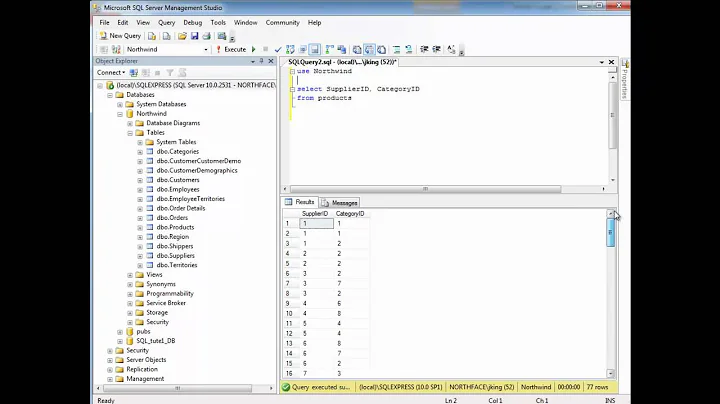SELECT COUNT(DISTINCT... ) error on multiple columns?
Solution 1
COUNT() in SQL Server accepts the following syntax
COUNT(*)
COUNT(colName)
COUNT(DISTINCT colName)
You can have a subquery which returns unique set of make and model that you can count with.
SELECT COUNT(*)
FROM
(
SELECT DISTINCT make, model
FROM VehicleModelYear
) a
The "a" at the end is not a typo. It's an alias without which SQL will give an error ERROR 1248 (42000): Every derived table must have its own alias.
Solution 2
Try combining them into a single field:
SELECT COUNT(DISTINCT make + ' ' + model)
FROM VehicleModelYear
Solution 3
The syntax is valid SQL but has not been implemented in SQL-Server.
Try a rewrite:
; WITH cte AS
( SELECT DISTINCT make, model
FROM VehicleModelYear
)
SELECT COUNT(*) AS total
FROM cte ;
or:
; WITH cte AS
( SELECT COUNT(DISTINCT model) AS cnt
FROM VehicleModelYear
GROUP BY make
)
SELECT SUM(cnt) AS total
FROM cte ;
or:
; WITH cte AS
( SELECT NULL AS n
FROM VehicleModelYear
GROUP BY make, model
)
SELECT COUNT(*) AS total
FROM cte ;
And finally, the 2nd and 3rd query above modified, without subqueries:
SELECT DISTINCT
SUM(COUNT(DISTINCT model)) OVER () AS total
FROM VehicleModelYear
GROUP BY make ;
SELECT DISTINCT COUNT(*) OVER () AS total
FROM VehicleModelYear
GROUP BY make, model ;
Late additions by @Alexander Fedorenko:
SELECT TOP (1)
SUM(COUNT(DISTINCT model)) OVER () AS total
FROM VehicleModelYear
GROUP BY make ;
SELECT TOP (1) COUNT(*) OVER () AS total
FROM VehicleModelYear
GROUP BY make, model ;
or:
; WITH cte AS
( SELECT DENSE_RANK() OVER(ORDER BY make, model) AS dr
FROM VehicleModelYear
)
SELECT MAX(dr) AS total
FROM cte ;
Related videos on Youtube
csab
Updated on July 30, 2020Comments
-
csab over 3 years
I have a table, VehicleModelYear, containing columns id, year, make, and model.
The following two queries work as expected:
SELECT DISTINCT make, model FROM VehicleModelYear SELECT COUNT(DISTINCT make) FROM VehicleModelYearHowever, this query doesn't work
SELECT COUNT(DISTINCT make, model) FROM VehicleModelYearIt's clear the answer is the number of results returned by the first query, but just wondering what is wrong with this syntax or why it doesn't work.
-
 Tim Schmelter over 10 yearspossible duplicate of Counting DISTINCT over multiple columns
Tim Schmelter over 10 yearspossible duplicate of Counting DISTINCT over multiple columns
-
-
 Tim Schmelter over 10 yearsor
Tim Schmelter over 10 yearsorSELECT COUNT(DISTINCT CHECKSUM(make, model)) FROM VehicleModelYear -
Iain Samuel McLean Elder about 10 yearsWhen I can find a scalar expression that maps back to columns, when the columns are strings or easily castable, and when there are few columns in the expression, I use this. It's quick and dirty.
-
 Davie Brown over 8 yearsIf not referring to columns which are strings, for example int columns - this answer doesn't result in the correct value but won't generate an error when being executed. As @Ian Elder's comment states,the columns could be casted in order to get this to work correctly. Anyone have some info on why this doesn't fail (for int columns) and what's going on?
Davie Brown over 8 yearsIf not referring to columns which are strings, for example int columns - this answer doesn't result in the correct value but won't generate an error when being executed. As @Ian Elder's comment states,the columns could be casted in order to get this to work correctly. Anyone have some info on why this doesn't fail (for int columns) and what's going on? -
bfs about 8 yearsChecksum is better as you do not have to worry about casting.
-
m12lrpv about 6 yearsBe sure to run a performance comparison of the checksum solution vs just wrapping the multi column distinct into another sub query and doing a count on that.







![Count Distinct IF criteria is met | Calculate Unique Count Where Condition [Data Studio Tutorial]](https://i.ytimg.com/vi/jDfxfMQ5Rk4/hq720.jpg?sqp=-oaymwEcCNAFEJQDSFXyq4qpAw4IARUAAIhCGAFwAcABBg==&rs=AOn4CLBqptVqYcfgC_WHyFWhTKKXMLQe0g)

